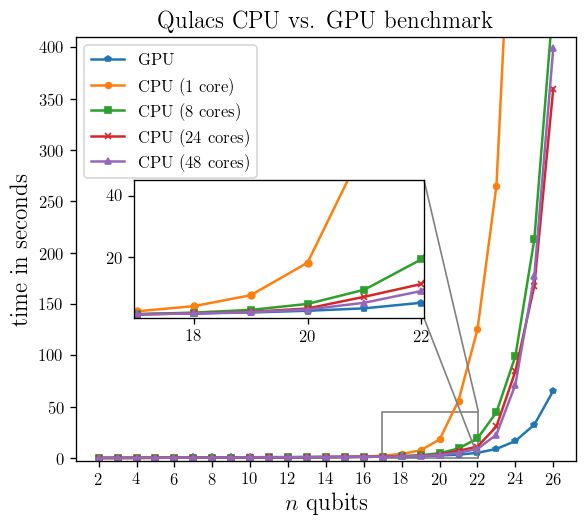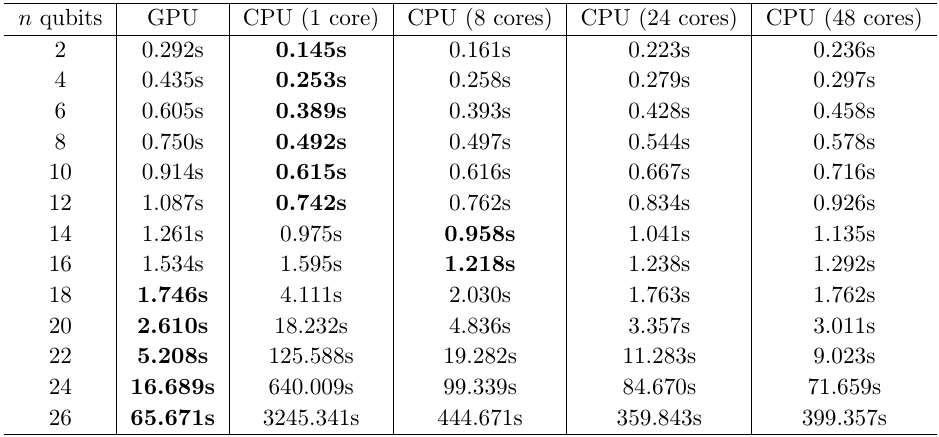PennyLane plugin for Qulacs.
Project description






The PennyLane-Qulacs plugin integrates the Qulacs quantum computing framework with PennyLane’s quantum machine learning capabilities.
PennyLane is a cross-platform Python library for quantum machine learning, automatic differentiation, and optimization of hybrid quantum-classical computations.
Qulacs is a software library for quantum computing, written in C++ and with GPU support.
The plugin documentation can be found here: https://docs.pennylane.ai/projects/qulacs.
Features
Provides access to Qulacs’ simulator backend via the qulacs.simulator device
Support for all PennyLane core functionality
Benchmarks
We ran a 100 executions of 4 layer quantum neural network strongly entangling layer and compared the runtimes between CPU and GPU.


Installation
This plugin requires Python version 3.6 or above, as well as PennyLane and Qulacs. Installation of this plugin, as well as all dependencies, can be done using pip:
$ pip install pennylane-qulacs["cpu"]Note that you need to include whether to install the CPU version (pennylane-qulacs["cpu"]) or the GPU version (pennylane-qulacs["gpu"]) of Qulacs for it to be installed correctly. Otherwise Qulacs will need to be installed independently:
pip install qulacs pennylane-qulacsAlternatively, you can install PennyLane-Qulacs from the source code by navigating to the top directory and running:
$ python setup.py installDependencies
PennyLane-Qulacs requires the following libraries be installed:
Python >= 3.6
as well as the following Python packages:
If you currently do not have Python 3 installed, we recommend Anaconda for Python 3, a distributed version of Python packaged for scientific computation.
Tests
To test that the PennyLane-Qulacs plugin is working correctly you can run
$ make testin the source folder.
Documentation
To build the HTML documentation, go to the top-level directory and run:
$ make docsThe documentation can then be found in the doc/_build/html/ directory.
Contributing
We welcome contributions - simply fork the repository of this plugin, and then make a pull request containing your contribution. All contributers to this plugin will be listed as authors on the releases.
We also encourage bug reports, suggestions for new features and enhancements, and even links to cool projects or applications built on PennyLane.
Support
Source Code: https://github.com/PennyLaneAI/pennylane-qulacs
Issue Tracker: https://github.com/PennyLaneAI/pennylane-qulacs/issues
PennyLane Forum: https://discuss.pennylane.ai
If you are having issues, please let us know by posting the issue on our Github issue tracker, or by asking a question in the forum.
License
The PennyLane-Qulacs plugin is free and open source, released under the Apache License, Version 2.0.
Project details
Release history Release notifications | RSS feed
Download files
Download the file for your platform. If you're not sure which to choose, learn more about installing packages.
Source Distributions
Built Distribution
File details
Details for the file pennylane_qulacs-0.36.0.post0-py3-none-any.whl.
File metadata
- Download URL: pennylane_qulacs-0.36.0.post0-py3-none-any.whl
- Upload date:
- Size: 14.0 kB
- Tags: Python 3
- Uploaded using Trusted Publishing? No
- Uploaded via: twine/5.1.1 CPython/3.12.5
File hashes
| Algorithm | Hash digest | |
|---|---|---|
| SHA256 | b9042c028f25b39871b503295e5c158abf405fd7568c71845f6ac76f4f8e53b8 |
|
| MD5 | fa921acb00d08f8696d2ec42854b8939 |
|
| BLAKE2b-256 | 09c2b6233427be0739f71d883cb85945463afa3af7db570f0531fc8007bad676 |












